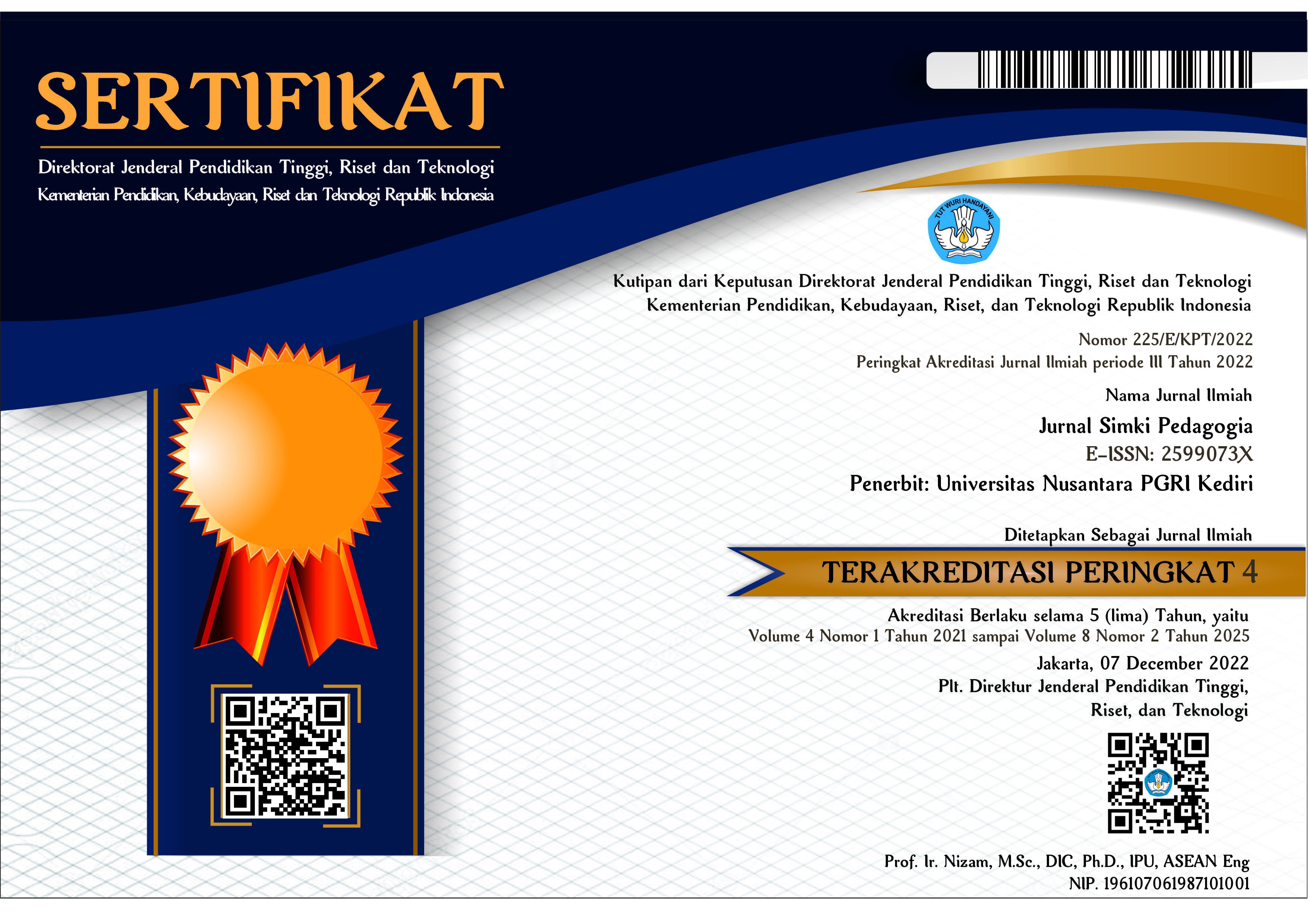Melalui Practice-Feedback untuk Meningkatkan Kemampuan Guru Menyusun Evaluasi Hasil Belajar Di SDN Bakalan, Sumobito, Kabupaten Jombang
 Abstract views: 224
,
Abstract views: 224
,
 PDF (Bahasa Indonesia) downloads: 196
PDF (Bahasa Indonesia) downloads: 196
Abstract
Based on the results of classroom supervision conducted by researchers as school principals on the ability of teachers at SDN Bakalan, Sumobito District, Jombang Regency, it shows that teachers often compose questions, both daily tests and midterm tests, are still guided by LKS. This means that the teachers arrange the questions by taking all or part of the LKS questions. In addition, the teachers at this school also used tests that had existed in previous years and then adapted them to the teaching materials. This situation makes the test inaccurate with the basic competencies required in the curriculum. This study aims to determine the increase in teachers' abilities in compiling evaluations of learning outcomes through Practice Feedback at SDN Bakalan, Sumobito District, Jombang Regency in the 1st semester of the 2022-2023 school year. The research method used was school action research. The conclusion of the results of this study is that through practice feedback can improve teachers' abilities in compiling evaluations of learning outcomes at SDN Bakalan, Sumobito District, Jombang Regency in the odd semester of the 2022-2023 school year. This is evident from the results of observations which show the results in cycle I the percentage of the teacher's ability to prepare evaluations of learning outcomes was 75.4% in the sufficient category, then increased in cycle II to 91.7% in the very good category. In addition, the supervision of school principals using the group discussion technique showed that teachers' readiness to participate in activities in cycle I obtained an average percentage of 78.6% in the good category and increased in cycle II to 97.9% in the very good category.
Downloads
References
Arikunto, S. (2009). Prosedur Penelitian Suatu Pendekatan Praktek. Jakarta: Rineka Cipta.
Arikunto, S. (2010). Dasar-dasar Evaluasi Pendidikan. Jakarta: Bumi Aksara.
B. Uno, H. (2014). Profesi Kependidikan. PT Bumi Aksara.
Depdiknas. (2003). Undang-Undang No.20 Tahun 2003. In Departemen Pendidikan Nasional.
Depdiknas. (2006). Tentang Standar Nasional Pendidikan. Jakarta: Depdiknas.
Lasmahadi, A. (2000). Sistem Manajemen SDM Berbasis Kompetensi. Tersedia Secara Online Di: Www. Epsikologi. Com [Diakses Di Bandung, Jawa Barat, Indonesia: 10 Januari 2019].
Moedjiono, & Dimyati. (1999). Strategi Belajar Mengajar. Jakarta : Departemen Pendidikan dan Kebudayaan.
Osnal, Suhartoni, & Wahyudi, I. (2016). Meningkatkan Kemampuan Guru dalam Menyusun Tes Hasil Belajar Akhir Semester melalui Workshop di KKG Gugus 02 Kecamatan Sumbermalang Tahun 2014/2015. Pancaran Pendidikan, 5(1). https://jurnal.unej.ac.id/index.php/pancaran/article/view/2604
Permana, J. (1999). Strategi Belajar Mengajar. Jawa Tengah:Depdikbud Direktorat Jendral.
Sudjana, N. (2006). Metode Statistik. Bandung: Rineka Cipta.
Sudjana, N. (2011). Penilaian Hasil Proses Belajar Mengajar (Edisi ke-16). Sinarbaru.
Sugiono. (2016). Metode Pendekatan Kuantitatif, kualitatif dan R&D. In Bandung: Alfabeta.
Wardhani, D. (2007). Penelitian Tindakan Kelas. Jakarta: Universitas Terbuka.
Copyright (c) 2023 Chusnul Chotimah

This work is licensed under a Creative Commons Attribution 4.0 International License.

Jurnal Simki Pedagogia : https://jiped.org/index.php/JSP/index is licensed under a Creative Commons Attribution 4.0 International License.
















